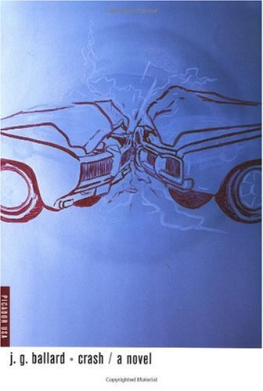James Ballard - Billennium
Here you can read online James Ballard - Billennium full text of the book (entire story) in english for free. Download pdf and epub, get meaning, cover and reviews about this ebook. genre: Prose. Description of the work, (preface) as well as reviews are available. Best literature library LitArk.com created for fans of good reading and offers a wide selection of genres:
Romance novel
Science fiction
Adventure
Detective
Science
History
Home and family
Prose
Art
Politics
Computer
Non-fiction
Religion
Business
Children
Humor
Choose a favorite category and find really read worthwhile books. Enjoy immersion in the world of imagination, feel the emotions of the characters or learn something new for yourself, make an fascinating discovery.

- Book:Billennium
- Author:
- Genre:
- Rating:4 / 5
- Favourites:Add to favourites
- Your mark:
- 80
- 1
- 2
- 3
- 4
- 5
Billennium: summary, description and annotation
We offer to read an annotation, description, summary or preface (depends on what the author of the book "Billennium" wrote himself). If you haven't found the necessary information about the book — write in the comments, we will try to find it.
Billennium — read online for free the complete book (whole text) full work
Below is the text of the book, divided by pages. System saving the place of the last page read, allows you to conveniently read the book "Billennium" online for free, without having to search again every time where you left off. Put a bookmark, and you can go to the page where you finished reading at any time.
Font size:
Interval:
Bookmark:
Billennium
J. G. Ballard
All day long, and often into the early hours of the morning, the tramp of feet sounded up and down the stairs outside Ward's cubicle. Built into a narrow alcove in a bend of the staircase between the fourth and fifth floors, its plywood walls flexed and creaked with every footstep like the timbers of a rotting windmill. Over a hundred people lived in the top three floors of the old rooming house, and sometimes Ward would lie awake on his narrow bunk until 2 or 3 a.m., mechanically counting the last residents returning from the all-night movies in the stadium half a mile away. Through the window he could hear giant fragments of the amplified dialogue booming among the rooftops. The stadium was never empty. During the day the huge four-sided screen was raised on its davit and athletics meetings or football matches ran continuously. For the people in the houses abutting the stadium the noise must have been unbearable.
Ward, at least, had a certain degree of privacy. Two months earlier, before he came to live on the staircase, he had shared a room with seven others on the ground floor of a house in 755th Street, and the ceaseless press of people jostling past the window had reduced him to a state of exhaustion. The street was always full, an endless clamour of voices and shuffling feet. By 6.5% when he woke, hurrying to take his place in the bathroom queue, the crowds already jammed it from sidewalk to sidewalk, the din punctuated every half minute by the roar of the elevated trains running over the shops on the opposite side of the road. As soon as he saw the advertisement describing the staircase cubicle he had left (like everyone else, he spent most of his spare time scanning the classifieds in the newspapers, moving his lodgings ah average of once every two months) despite the higher rental. A cubicle on a staircase would almost certainly be on its own.
However, this had its drawbacks. Most evenings his friends from the library would call in, eager to rest their elbows after the bruising crush of the public reading room. The cubicle was slightly More than four and a half square metres in floor area, half a square metre over the statutory maximum for a single person, the carpenters having taken advantage, illegally, of a recess beside a nearby chimney breast. Consequently Ward had been able to fit a small straight-backed chair into the interval between the bed and the door, so that only one person at a time needed to sit on the bedin most single cubicles host and guest had to sit side by side on the bed, conversing over their shoulders and changing places periodically to avoid neck-strain.
"You were lucky to find this place," Rossiter, the most regular visitor, never tired of telling him. He reclined back on the bed, gesturing at the cubicle. "It's enormous, the perspectives really zoom. I'd be surprised if you haven't got at least five metres here, perhaps six."
Ward shook his head categorically. Rossiter was his closest friend, but the quest for living space had forged powerful reflexes. "Just over four and a half, I've measured it carefully. There's no doubt about it."
Rossiter lifted one eyebrow. "I'm amazed. It must be the ceiling then."
Manipulating the ceiling was a favourite trick of unscrupulous landlordsmost assessments of area were made upon the ceiling, out of convenience, and by tilting back the plywood partitions the rated area of a cubicle could be either increased, for the benefit of a prospective tenant (many married couples were thus bamboozled into taking a single cubicle), or decreased temporarily on the visits of the housing inspectors. Ceilings were criss-crossed with pencil marks staking out the rival claims of tenants on opposite sides of a party wall. Someone timid of his rights could be literally squeezed out of existencein fact, the advertisement "quiet clientele" was usually a tacit invitation to this sort of piracy.
"The wall does tilt a little," Ward admitted. "Actually, it's about four degrees outI used a plumb-line. But there's still plenty of room on the stairs for people to get by."
Rossiter grinned. "Of course, John. I'm just envious, that's all. My room is driving me crazy." Like everyone, he used the term "room" to describe his tiny cubicle, a hangover from the days fifty years earlier when people had indeed lived one to a room, sometimes, unbelievably, one to an apartment or house. The microfilms in the architecture catalogues at the library showed scenes of museums, concert halls and other public buildings in what appeared to be everyday settings, often virtually empty, two or three people wandering down an enormous gallery or staircase. Traffic moved freely along the centre of streets, and in the quieter districts sections of sidewalk would be deserted for fifty yards or more.
Now, of course, the older buildings had been torn down and replaced by housing batteries, or converted into apartment blocks. The great banqueting room in the former City Hall had been split horizontally into four decks, each of these cut up into hundreds of cubicles.
As for the streets, traffic had long since ceased to move about them. Apart from a few hours before dawn when only the sidewalks were crowded, every thoroughfare was always packed with a shuffling mob of pedestrians, perforce ignoring the countless "Keep Left" signs suspended over their heads, wrestling past each other on their way to home and office, their clothes dusty and shapeless. Often "locks" would occur when a huge crowd at a street junction became immovably jammed. Sometimes these locks would last for days. Two years earlier Ward had been caught in one outside the stadium, for over forty-eight hours was trapped in a gigantic pedestrian jam containing over 20,000 people, fed by the crowds leaving the stadium on one side and those approaching it on the other. An entire square mile of the local neighbourhood had been paralysed, and he vividly remembered the nightmare of swaying helplessly on his feet as the jam shifted and heaved, terrified of losing his balance and being trampled underfoot. When the police had finally sealed off the stadium and dispersed the jam he had gone back to his cubicle and slept for a week, his body blue with bruises.
"I hear they may reduce the allocation to three and a half metres," Rossiter remarked.
Ward paused to allow a party of tenants from the sixth floor to pass down the staircase, holding the door to prevent it jumping off its latch. "So they're always saying," he commented. "I can remember that rumour ten years ago."
"It's no rumour," Rossiter warned him. "It may well be necessary soon. Thirty million people are packed into this city now, a million increase in just one year. There's been some pretty serious talk at the Housing Department."
Ward shook his head. "A drastic revaluation like that is almost impossible to carry out. Every single partition would have to be dismantled and nailed up again, the administrative job alone is so vast it's difficult to visualize. Millions of cubicles to be redesigned and certified, licences to be issued, plus the complete resettlement of every tenant. Most of the buildings put up since the last revaluation are designed around a four-metre modulusyou can't simply take half a metre off the end of each cubicle and then say that makes so many new cubicles. They may be only six inches wide." He laughed. "Besides, how can you live in just three and a half metres?"
Rossiter smiled. "That's the ultimate argument, isn't it? They used it twenty-five years ago at the last revaluation, when the minimum was cut from five to four. It couldn't be done they all said, no one could stand living in only four square metres, it was enough room for a bed and suitcase, but you couldn't open the door to get in." Rossiter chuckled softly. "They were all wrong. It was merely decided that from then on all doors would open outwards. Four square metres was here to stay."
Font size:
Interval:
Bookmark:
Similar books «Billennium»
Look at similar books to Billennium. We have selected literature similar in name and meaning in the hope of providing readers with more options to find new, interesting, not yet read works.
Discussion, reviews of the book Billennium and just readers' own opinions. Leave your comments, write what you think about the work, its meaning or the main characters. Specify what exactly you liked and what you didn't like, and why you think so.






